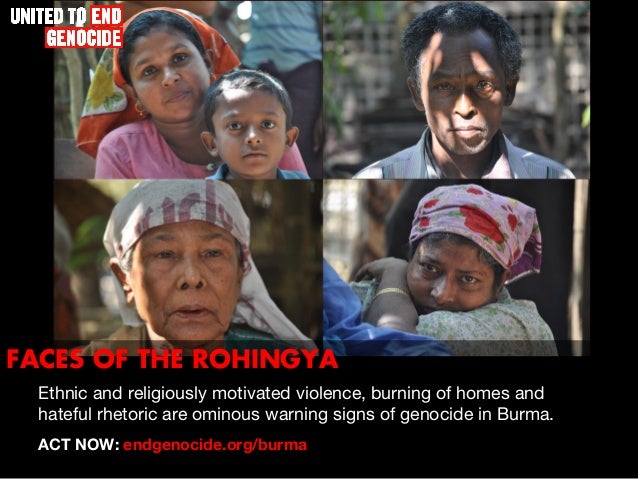
photos: United to End Genocide
for more information go to:
Listen to today’s feature:
-
 play_arrow
play_arrow
Ending Genocide, Japanese Internment Camps, Fracking kgnu
IN THE NEWS:
On May 8, 2014 the US House of Representatives passed a bi-partisan resolution HR 418 introduced by Congressman Jim McGovern of Massachusetts. The bill urges the Burmese government to end the persecution of Rohingya people of Burma-also known as Myanmar.
The origin of the Rohingya is disputed with some saying they are indigenous to the state of Burma and others contending that they are Muslim migrants who orginated in Bangladesh and migrated to Burma during the period of British rule.
Since 2012, about 140,000 Rohingya have been displaced and forced into camps and over 200 have been killed. The camps are described by human rights organizations as brutal concentration camps where basic human necessities are denied including the right to work, marry, have children, move, and to gain access to education and health care.
Rohingya people have been described by the United Nations as “one of the most persecuted in the world.” The human rights group United to End Genocide (UEG) has said that the violence is propagated by both the government of Burma and by radical Buddhist monks thereby creating an environment that is moving toward genocide. United to End Genocide has reported that the Muslim Rohingya have faced violent attacks on their communities and mass arrests as they have been isolated from international aid workers, independent observers, and journalists.
On Friday, KGNU spoke with Dan Sullivan, Director of Policy and Government Relations with UEG who just returned from the area.
_____________________
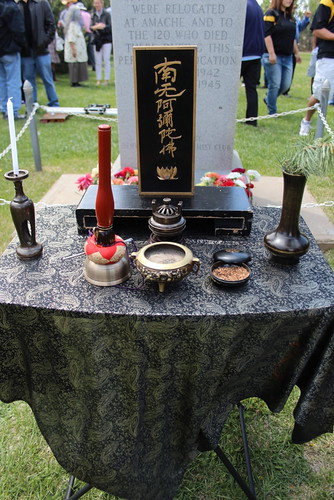
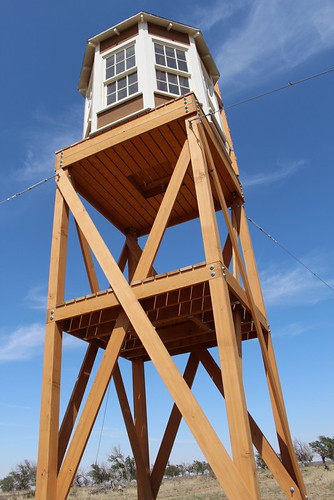
photos: KGNU News
At the cemetery commemoration of those who died at Amache. (second photo) The guard tower that was reconstructed to specifications of the original tower.
During WW II from 1942-1945 over 7,000 Japanese American citizens, were forcibly imprisoned at the Granada Relocation Center, more commonly called Amache in Granada, Colorado. Through Executive Order 9066, Japanese Americans were ordered to report to camps and were forced to abandon their homes, businesses, and belongings. Fear was spread through different methods to call the Japanese American community into question following the bombing of Pearl Harbor in 1941. Some were even accused of spying for the Japanese government. Those ordered to do so boarded trains and made the trip to relocation camps in Colorado, Arizona, Utah, Wyoming, Arkansas, Idaho and California. The Granada site is one of ten internment camps in these states. Amache, along with a museum is now maintained by the Amache Preservation Society, a student organization that was established by Granada High School teacher, Mr. John Hopper. The Society consists of student volunteers from the school, and other organizations including the Friends of Amache, The Japan America Society of Southern Colorado, Denver University and others. The Amache Preservation Society has begun renovation of Amache, particularly the cemetery. Since last year’s commemoration, the original water and guard towers have been reconstructed and plans are in place to continue renovation. Students involved in the project travel throughout Colorado and into Kansas and Oklahoma to speak about the World War II internment camps and specifically Amache. The students also travel to Japan to live with host families and speak about that era. On May 18, 1994 Amache was listed on the National Register of Historic Places. Saturday the 18th marked the 20th anniversary of this move which was commemorated at the Amache site and then later with a presentation at Granada High School.
This piece was produced by members of The Early Morning News team.
for more information go to:
http://www.thenationreport.org/pilgrimage-to-colorados-world-war-ii-concentration-camp/
_____________________________________
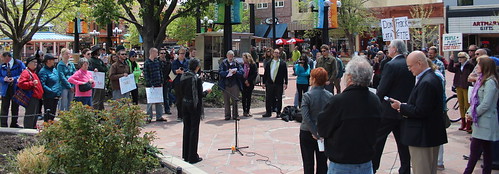
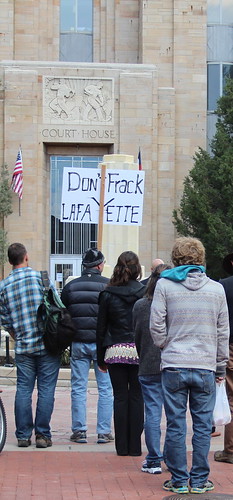
photos: KGNU news
Supporters outside of the Boulder County Courthouse who want Boulder County residents to have self-control over local issues.
With the 18-month moratorium on fracking due to expire January 1, 2015 Boulder County residents and the Boulder County Community Rights Network have taken action to move Boulder County to a “home rule” county. After a meeting with Boulder County Commissioners, the Commissioners conceded that under current statutory control, they lack the authority to ban fracking, an issue that could be decided under a “home rule” charter. After the Commissioners refused to participate in initiating Home Rule for Boulder County, the citizens began the process to pursue the initiative themselves. A Community Bill of Rights that would outline charter amendments such as the right to clean air and water, to be free of chemical trespass, the peaceful enjoyment of home, the rights of natural ecosystems, and the right to sovereignty and community self-determination was created. On May 13, 2015, the community gathered outside of the courthouse to announce their plans.


















